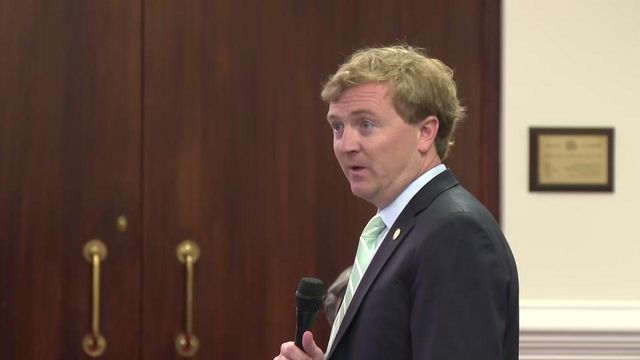Bill limiting discussions of racism, privilege, in NC classrooms moving forward

A bill meant to limit how race is discussed in North Carolina schools will be before the North Carolina House of Representatives as soon as Wednesday after passing a key legislative committee Tuesday evening.
House Bill 187 seeks to limit teaching about systemic racism and white privilege in North Carolina classrooms by laying out a number of topics teachers can technically broach, but in the bill’s words can’t “promote.”
That includes a ban on promoting the idea that anyone should feel guilt or discomfort for "actions committed in the past by other members of the same race or sex." It also forbids schools from promoting that anyone has “privileges” on account of their race or sex, that the United States is a racist or sexist country, advocating for the violent overthrow of the U.S. government or teaching that one race or sex is inherently superior.
“This bill does not change what history standards can and cannot be taught,” state Rep. John Torbett, the bill’s primary sponsor, said during Tuesday’s meeting, reading from a script he also used when the measure cleared a separate committee last week.
“It simply prohibits schools from endorsing discriminatory concepts,” said Torbett, R-Gaston.
Democrats on the committee pushed back against the measure, in part because they fear a chilling effect that will shut down classroom conversations about the role racism plays in the United States of America’s story. Several local parents spoke also against the bill, questioning Torbett’s contention that measure is meant to fight indoctrination.
Learning about slavery and feeling discomfort is “not indoctrination,” Cary mother Renee Sekel said. “It’s compassion. It’s common sense.”
Gov. Roy Cooper vetoed this bill two years ago, but Republicans strengthened their legislative majorities in the November elections, making it more difficult for General Assembly Democrats to uphold those vetoes. On Friday, Cooper let two bills he’d previously vetoed become law without his signature, at least in part because of this new mathematical reality.
Tuesday’s vote was in the House Rules Committee, which sets the calendar for House floor sessions. Committee Chairman Destin Hall, R-Caldwell, said to expect the measure on the floor Wednesday, or perhaps Thursday. From there it would move to the state Senate for more discussion.
The bill doesn’t mention critical race theory, or CRT, which is the study of systematic racism — a topic that has become the focus of legislation across the country and a frequent topic for right-wing media outlets. But it refers to concepts common to that graduate school-level framework for cultural critique. CRT is not taught in K-12 schools, but critics say some of its concepts have made their way into K-12 classrooms through teaching about white privilege and systemic racism.
Sponsors insist they’re not looking to shut down discussions about history or racism, and the bill has a handful of exceptions, including one to allow “the impartial instruction on the historical oppression of a particular group of people based on race, ethnicity, class, nationality, religion or geographic region.”
The bill also would allow reading assignments, discussion and speakers on topics that the bill says schools can’t promote, as long as parents are given 30 days notice first. The bill suggests that schools are supposed to review a potential speakers writings, including three years of their social media feeds, to see if they have “advocated” ideas targeted by the bill.
Torbett said he’d prefer a search through a potential speaker’s entire social media history, but legislative staff suggested 3 years.
Rep. Amos Quick, D-Guilford, said the bill creates two classes of speakers: Those who require parental notice and those who don’t. At one point Quick and other lawmakers were talking about a speaker coming in to teach children how to bake cookies versus one that Torbett suggested might "indoctrinate” students.
Rep. Carla Cunningham, D-Mecklenburg, agreed with Quick: Either require 30 days notice for all school speakers, or for none of them.
“We have an obesity epidemic,” she said, sticking with the cookie example. “Some parents may not want you talking about cookies. So, if you’re going to do it, make it for everybody.”
Torbett said schools should focus on the “wonderful parts” of American life that show people “growing together.” And he said the bill is meant to block “the potential for indoctrination … to a different system of government.”
“It could be socialism,” he said.











